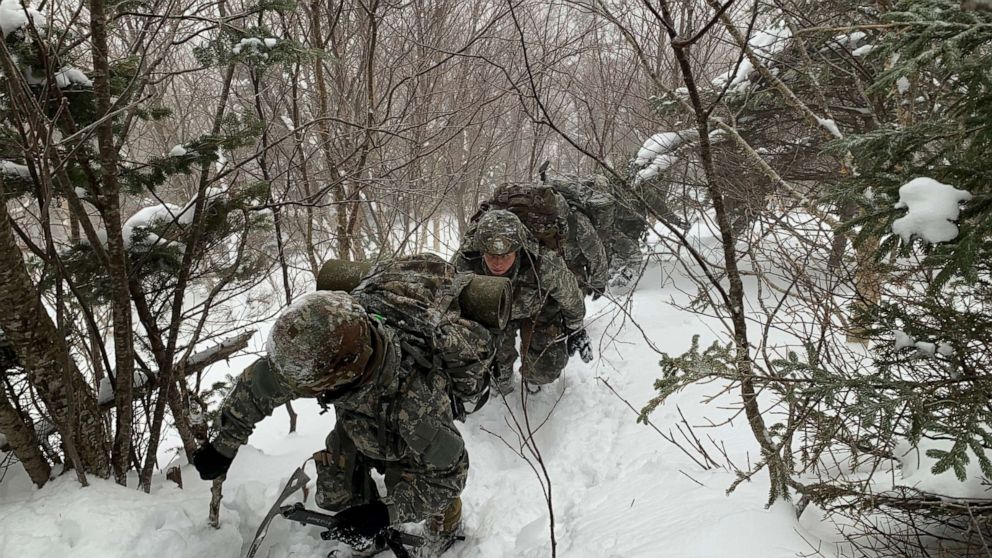Inside Army Mountain Warfare School as Pentagon moves to expand elite training
Nearly 50 years after the end of jungle combat in Vietnam, and decades of hot, sandy battles in the Middle East, the U.S. military has been quietly and urgently preparing for looming potential conflicts in frozen, mountainous terrain.
"Clearly we see the future and our defense of our nation is very critically dependent on our ability to operate in the Arctic," one top commander told Congress this month.
The Pentagon says the nation's top geopolitical rivals -- Russia and China -- merit close attention. Both regularly flaunt their military preparedness in harsh, wintry conditions as they continue to drive deeper into the Arctic toward America's northern frontier.

"We are now in an era of great power competition," Defense Secretary Mark Esper told reporters during a press conference last December.
To meet the threat, Congress late last year approved $30 million in new funding to bolster U.S. military readiness by expanding facilities at the elite Army Mountain Warfare School in northern Vermont.
On a recent visit to the school, ABC News saw firsthand how hundreds of soldiers learn to operate in the most extreme conditions each year and how growing demand for the training has strained available resources.
Soldiers are taught how to lead their units over technically difficult and hazardous terrain, cutting paths through 4 feet of snow up a steep mountain face or scaling a field of boulders in scorching summer heat. They practice laying fixed ropes to traverse narrow ridge lines and rappelling down craggy cliffs.
Cold weather survival skills are a top priority.

"Just surviving the environment is often the hardest part," said Maj. Steven Gagner, the commander of Army Mountain Warfare School.
The school also offers specialized training for mountain sharpshooting and medical evacuations -- skills which recent graduates said had proven valuable on subsequent tours in Afghanistan.
Gagner, a veteran of the wars in Iraq and Afghanistan, allowed ABC News to accompany a squad preparing for its final test in the basic mountain course: an 1,100-foot climb through heavy snow, a traverse along a blustery ridge using ropes, and a 50-foot rappel down an icy cliff.
The conditions are so challenging that Army trainers said there are some soldiers who drop out from nearly every course, some by choice but others are told to leave if they can't keep up with the squad.

The school's barracks, built in 1983, are dated and cramped. Drying equipment takes over classrooms, soldiers pack the bunk rooms and hallways and stairwells have become practice stations where clips and knots are bolted to the walls.
Roughly 1,000 service members graduate from courses here each year but demand has soared to 160% of capacity, Gagner said.
Active duty, National Guard and Reserve soldiers have all trained at the school since it was founded nearly 40 years ago, along with members of every military branch including the elite Navy SEALs.
Funding for a new facility will increase the number of beds from 64 to 140 and add a separate indoor climbing wall.
Just last year, Esper, then-secretary of the Army, cast a spotlight on the importance of winter mountain training during a visit to the school to climb the ice and meet with instructors.
"Your mission is a unique one that will prove critical in the future. We must be prepared to win the first battles of the next wars no matter what the environment," Esper wrote to the school leadership in a letter after his visit.
In 2017, ABC News saw firsthand how Russia is preparing for its military expansion into the Arctic, staking a claim on tundra that's becoming strategically important due to climate change. China and North Korea regularly publicize similar military winter training exercises in mountainous terrain.
"We train soldiers to fight and win and be more mobile and lethal and survive any environment they come into contact with," Gagner said.
This report was featured in the Feb. 26 episode of “Start Here,” ABC News’ daily news podcast.
"Start Here" offers a straightforward look at the day's top stories in 20 minutes. Listen for free every weekday on Apple Podcasts, Google Podcasts, Spotify, the ABC News app or wherever you get your podcasts.




